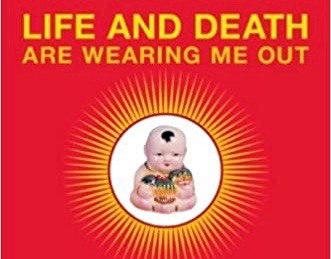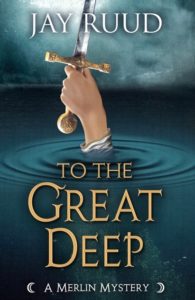Life and Death are Wearing Me Out
Mo Yan (2006)
[av_image src=’http://jayruud.com/wp-content/uploads/2014/08/Shakespeare-180×180.jpg’ attachment=’76’ attachment_size=’square’ align=’left’ animation=’left-to-right’ link=” target=” styling=” caption=’yes’ font_size=” appearance=’on-hover’]
Most American readers don’t really know much about contemporary Chinese novelist Mo Yan, or if they’ve heard of him at all it’s because they remember he won the Nobel Prize for Literature in 2012. He first gained international fame with the novel Red Sorghum, which was made into an award winning Chinese film the year of its release, and was translated into English in 1993. The film was an international sensation, and the novel established Mo Yan’s reputation as a writer in the “magic realist” style. Life and Death are Wearing Me Outstays in that magic realist tradition, and, like Red Sorghum, tells a family history over several generations, but it does so in a black humor style that makes it, despite its 540 small-print pages, a real treat to read, and an excellent introduction to Mo Yan if you’re looking to add contemporary China’s greatest living author to your circle of literary acquaintances.
The novel follows a particular family, the Ximen family, in Gaomi County of Shandong Province in mainland China, from 1950 (shortly after Mao Zedong established the People’s Republic of China in 1949) until 2000, nearly a quarter of a century after Mao’s death, and takes us through the various political upheavals during that time, focusing specifically on how those changes affected ordinary people in the small rural village of “Northeast Township.” Mo Yan himself was born as Guan Moye in that same Gaomi County in 1955, and uses that setting he knows so well as the background of this novel. He adopted the pen name “Mo Yan,” by the way, because it means, in Chinese, “don’t speak”—which is what his parents used to say to him when he was growing up in the late 1950s and ’60s, when speaking your mind about politics in the hearing of neighbors could get you into trouble. When he began to publish stories and novels that reinterpreted his country’s history in the freer 1980s, he adopted the advice as his pen name—and he has since legally changed his name to Mo Yan, since as it turned out he could not receive royalties under a pseudonym.
But Mo Yan doesspeak in this novel, about politics, social customs, and family ties, in a comic, ironic tone that has been compared to Kafka or Joseph Heller, Kurt Vonnegut or Laurence Sterne, Rabelais or Jonathan Swift. The book begins during the Land Reform at the beginning of Mao’s tenure, moves through the Cultural Revolution and the Great Leap Forward, then through Mao’s death to the “Reform Period” and ultimately the “capitalism with socialist characteristics” of modern China, focusing on how all these developments play out among real people in the small country village of the novel.
The book opens as Ximen Nao, perhaps the wealthiest landowner in Gaomi county, is dragged out and shot by his neighbors, as his land is taken from him to be divided among his fellow villagers during the communist “Land Reform” of 1948. Ximen Nao insists that he does not deserve this treatment, that he has been a good man who has dealt honestly with his neighbors, his family (including his wife and concubines), his tenants and his laborers. But his protests are to no avail, and we suspect that, though he may not have deserved his treatment, he may not have been quite as perfect as he believes. In any case, he continues to dispute the justice of his fate even after he reaches the underworld, where Yama, the Lord of the Underworld in ancient Chinese mythology, cannot get him to stop his grousing and finally decides to send him back to earth—but as a donkey.
This begins a series of successive transmigrations of Ximen Nao’s soul through donkey to ox to pig to dog to monkey. As a donkey, he is born on January 1, 1950, on the land of his former farmhand Lan Lian, now married to Ximen Nao’s first concubine, Yingchun. Lan Lian (known as “blue face” because of an unfortunate birthmark) is something of a rebel against the collectivization of farming after land reform. Despite Mao’s expressed promise that all farmers had the right to remain independent farmers if they so desired, there is virtually irresistible public pressure to join the commune. Lan Lian, however, continues to resist, and is ultimately the last independent farmer in all of China. But this makes him a pariah in his neighborhood, and causes a rift in his family, with Ximen Jinlong, his elder step-son (actually Ximen Nao’s son with Yingchun), insisting on joining the commune while his own younger son, Lan Jiefang (inheritor of the blue-face birthmark) stays with his father, and with their one asset, Ximen Donkey.
The donkey stays with Lan Lian for ten years, and it is the donkey himself who narrates events, striking a comic balance between memories of his life on earth and adaptation to life as a beast of burden in the new China. But as the village suffers during demands for false and impossible production quotas during the “Great Leap Forward” and, as a result, is plunged into the great famine of 1959-61 in which tens of millions of Chinese starved to death, Ximen Donkey cannot survive the times. As Mo Yan describes it, “Then the famine came, turning the people into wild animals, cruel and unfeeling. After eating all the bark from trees and the edible grass, a gang of them charged into the Ximen estate compound like a pack of starving wolves”—an attack in which the donkey is killed for his meat.
Returned to the great god Yama, Ximen’s soul is sent back to earth for another try—this time as an ox. Again, he belongs to Lan Lian. Ximen Ox and his successor, Ximen Pig, retain their connections to Lan and his family, and while Lan holds on to his independent farm, his son Lan Jiefang deserts him and follows his brother Ximen Jinlong into service with the party as local officials. Eventually Lan Jiefang takes over some of the narration of the story, alternating with the animal incarnations of Ximen Nao.
In its later chapters, during the lives of Ximen Dog and Ximen Monkey, the narrative focuses more on Lan’s children, and ultimately on theirchildren, and we are able to witness how Lan Lian’s chief trait of stubbornness, like his blue birthmark, manifests itself in his son and in his grandson, both of whom, like Lan himself, pursue courses of action that ostracize them from the community. We also witness Ximen Nao’s son, Ximen Jinlong, repeating the sins of his own father, pursuing crazy capitalist schemes for personal gain.
Will Ximen ever break this cycle of reincarnation and attain human status once again? Presumably Ximen’s soul is refining itself through the many lives it lives, but it is also witness to the social upheavals of history that ultimately do suggest that his death in that land reform really was unjust, since his village ends up in a situation wherein wealth is inequitably distributed once again, and wherein those who hold it are far less ethical than he was himself.
As a side note, the post-modern, metafictional narration of the book includes a character named Mo Yan who pops up from time to time in the village. In a comic self-deprecating manner, the character of Mo Yan is untrustworthy and rather lazy: “Mo Yan was never much of a farmer. His body may have been on the farm, but his mind was in the city. Lowborn, he dreamed of becoming rich and famous; ugly as sin, he sought the company of pretty girls; generally ill-informed, he passed himself off as a knowledgeable academic. And with all that, he managed to establish himself as a writer, someone who dined on tasty pot stickers in Beijing every day.” As the book reaches its climax, the character Mo Yan takes a larger part and actually proves helpful to one of the major characters.
Overall, this book is a rollicking adventure that tells an epic tragic-comic story of one family caught in the great upheavals of history. Howard Goldblatt’s 2008 translation is highly readable, and includes a helpful list of “Principal Characters” at the beginning that you will probably need to refer to often. I would have welcomed a larger identifying list of characters: Since many of the characters’ names are similar, I was often unsure where I had seen this or that name before, but unless it was one of the major characters, I was stymied. But these are minor concerns. This is a novel of huge significance that is sure to make an indelible impact on your soul. You may even remember it in your next several lives. Four Shakespeares for this one.
NOW AVAILABLE:
To the Great Deep, the sixth and final novel in my Merlin Mysteries series, is now available from the publisher, Encircle Publishing, at http://encirclepub.com/product/to-the-great-deep/
You can also order from Amazon (a Kindle edition is available) at https://www.amazon.com/Jay-Ruud/e/B001JS9L1Q?ref=sr_ntt_srch_lnk_1&qid=1594229242&sr=8-1
Here’s what the book is about:
When Sir Agravain leads a dozen knights to arrest Lancelot in the queen’s chamber, he kills them all in his own defense-all except the villainous Mordred, who pushes the king to make war on the escaped Lancelot, and to burn the queen for treason. On the morning of the queen’s execution, Lancelot leads an army of his supporters to scatter King Arthur’s knights and rescue Guinevere from the flames, leaving several of Arthur’s knights dead in their wake, including Sir Gawain’s favorite brother Gareth. Gawain, chief of what is left of the Round Table knights, insists that the king besiege Lancelot and Guinevere at the castle of Joyous Gard, goading Lancelot to come and fight him in single combat.
However, Merlin, examining the bodies on the battlefield, realizes that Gareth and three other knights were killed not by Lancelot’s mounted army but by someone on the ground who attacked them from behind during the melee. Once again it is up to Merlin and Gildas to find the real killer of Sir Gareth before Arthur’s reign is brought down completely by the warring knights, and by the machinations of Mordred, who has been left behind to rule in the king’s stead.


